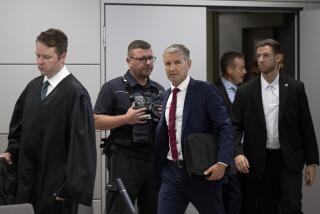German Ban on Holocaust Denial Upheld : Justice: Rightists sued Munich after a speech was forbidden. But high court says the ‘Auschwitz Lie’ is not protected.
- Share via
BONN — Germany’s highest court ruled Tuesday that those who spread the “Auschwitz Lie”--the denial that the Holocaust ever took place--are not protected by freedom of speech and may be banned from stating their inaccurate views in public.
The Constitutional Court, the German equivalent of the U.S. Supreme Court, said the extermination of 6 million Jews in Hitler’s concentration camps is a fact and that Holocaust denial is a “proven untruth.”
The court backed the city of Munich, which had threatened to break up a rally by the radical rightist National Democratic Party on March 12, 1991, if the party’s guest speaker delivered, as planned, a speech denying that the Holocaust occurred. The party held its rally and its tongue, but it later sued the city for violating members’ freedom of speech.
But “proven untruthful statements do not have the protection of freedom of speech,” Justice Dieter Grimm said after the decision was released in Karlsruhe. “Disavowal of the killing of the Jews during the Third Reich is such a statement. This statement also is an insult to those Jews living in Germany today.”
The high court’s position would seem to be a reversal of the stand taken by the highest appeals court last month when it ruled in another case that the National Democratic Party’s leader, Guenter Deckert, could not be convicted of inciting racial hatred simply for denying the Holocaust. German politicians and national and international Jewish leaders criticized that decision as a step back from existing laws prohibiting dissemination of Nazi ideology.
In Germany, it is illegal to wear a swastika, sell copies of Hitler’s book, “Mein Kampf,” or give the Nazi salute. German courts traditionally have considered an individual’s denial of the Holocaust to be a racist act and linked to racist violence.
Neo-Nazis are a small but radical fringe that has grown bolder in the last four years, lashing out in violent attacks against Jews and foreigners that have left more than 30 foreigners dead. On the eve of Passover last month, a synagogue in the northern town of Luebeck was firebombed, presumably by rightists.
The “Auschwitz Lie,” which incorrectly asserts that the Holocaust is merely the invention of Jews and conspiracists, is a favorite theme among neo-Nazis in Germany and the United States.
Jewish leaders have fought to keep this erroneous view out of mainstream historical discussions, particularly as the generation of Holocaust survivors dies out and polls show an alarming lack of knowledge among young people about the systematic genocide. They greeted the court’s decision Tuesday as a positive step.
“The Constitutional Court upheld the threat to ban the rally, and that means you can’t spout the ‘Auschwitz Lie,’ ” said Rabbi Marvin Hier, dean of the Simon Wiesenthal Center in Los Angeles. “This is not the American way (of making law), and personally I would prefer greater First Amendment rights for the protection of minorities. . . . But to the extent you now schedule a public rally with speakers propagating the revisionist lie, those people run the risk of going to jail, and, to that extent, this will stop it.”
The center was a harsh critic of the appeals court last month in Deckert’s case. The former schoolteacher had been convicted of inciting hatred in 1992 for arranging a lecture by American neo-Nazi Fred Leuchter, an execution-chamber designer who told the party that he had visited Auschwitz and proven it never had any gas chambers.
Tuesday’s case involved a British revisionist historian, David Irving, who also had planned to deny the Holocaust at a National Democratic Party rally in Munich. Irving falsely claims the Holocaust has been exaggerated, and he argues that Hitler did not know it was happening.
More to Read
Sign up for Essential California
The most important California stories and recommendations in your inbox every morning.
You may occasionally receive promotional content from the Los Angeles Times.













